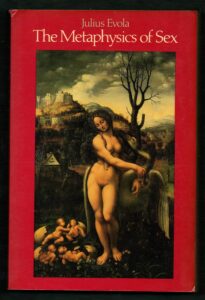of Sex
by Julius Evola [1]
 In this field, as in every other, our contemporaries have shown no interest in the search for ultimate meanings… The same is mainly true of the writers, past and present, who have dealt with love rather than specifically with sex. For the most part, they have kept to the field of psychology and, within that, to a general analysis of feelings. Even the writings of such authors as Stendhal, Bourget, Balzac, Solovieff, and D.H. Lawrence have little to do with the deepest meaning of sex. [page 1]
In this field, as in every other, our contemporaries have shown no interest in the search for ultimate meanings… The same is mainly true of the writers, past and present, who have dealt with love rather than specifically with sex. For the most part, they have kept to the field of psychology and, within that, to a general analysis of feelings. Even the writings of such authors as Stendhal, Bourget, Balzac, Solovieff, and D.H. Lawrence have little to do with the deepest meaning of sex. [page 1]
Scientists who try to investigate sexuality by studying others rather than themselves are in error, for they cannot approach the depth of the metaphysics of sex… Without this knowledge, man can only take eros to the exalted boarders of the human, of his passion and feeling. Only poetry, lyrics, and idealized romanticism are created, while everything else is eradicated. [page 2]
…men and women belonging to a phase of civilization oriented toward materialism… In this, as in all other spheres, statistics are worthless. Such criterion can be left to the trivial methods of Kinsey. [page 3]
The problem is subjective… Furthermore, papers on sexological research with scientific pretentions are in general ludicrously incompetent; for here firsthand understanding of the experience is the sine qua non. [pages 4-5]
Sex in the world today
Women is presented in a thousand forms to attract man and stupefy him sexually. [page 6]
Tolstoy once had occasion to say to Gorki: “For the French a woman comes before anything else. They are a weak, degraded people. Doctors say that all consumptives are sensual.” If we leave the French aside, it remains true that a universal and feverish interest in sex and woman is the mark of every twilight period and that this phenomenon today is among the many signs that this epoch is the terminal phase of a regressive process. Classical antiquity formulated an analogy with the human organism: In man, the head, the breast, and the lower parts of the body correspond respectively to the seats of intellectual life, of spiritual and heroic courage, and finally of nourshiment and sex. Corresponding to this are three human types and, we may add, three types of civilization. It is clear that today by regression we are living in a civilization whose predominant interest is neither intellectual, spiritual, nor heroic, nor even directed to the higher forms of emotion. Rather the subpersonal—sex and the belly—are idolized; and therefore the unfortunate saying of a poet may become a reality: Hunger and love will shape history. Hunger is the chief cause of social disaster and economic strife. The emphasis given to woman, love, and sex is counterpart.
Further evidence is provided by the ancient Hindu tradition of the four ages of the world in Tantric formulation. A fundamental characteristic of the last or so-called Dark Age (Kali Yuga) is the awakening and ultimate dominance of Kali, who stamps the epoch with her sign…
This study will highlight the opposition of the metaphysics of sex to established, conventional viewpoints, and this contrast will make even more apparent the inner fall of modern man. [pages 7-8]
_____________
[1] Excerpts from the Introduction of The Metaphysics of Sex (NY: Inner Traditions International, 1983).
One reply on “Metaphysics”
It’s curious that for decades I had wanted to write an autobiographical book that I never did: In Search of the Soulmate.
The reason I didn’t do it was because it would draw too much attention to my mind and my defence mechanisms after my parents abused me, rather than to their behaviour.
Still, if at least one book in my trilogy found a publisher and sold well enough, I might still do it. The 1990 Nobel Prize winner of literature who lived near my place (although we never met), Octavio Paz, wrote The Double Flame: Love and Eroticism at age 72! It has veiled, though retrospective, autobiographical overtones.